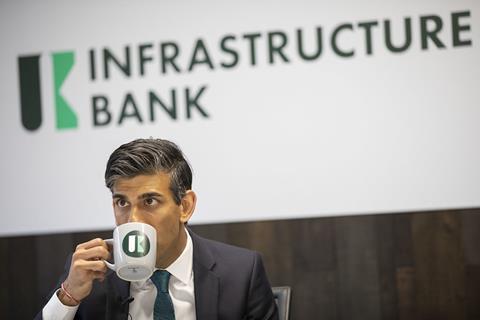The UKIB may not be funding projects that wouldn’t have been delivered anyway by the private sector, the Public Accounts Committee has said
The UK Infrastructure Bank set up to pump £22bn into infrastructure lacks a “clear strategic approach” and may not be achieving anything the private sector wouldn’t have delivered anyway, a committee of MPs has said.
The Public Accounts Committee (PAC), which scrutinises government spending, this week published a scathing report into the UKIB, which was set up by the chancellor Rishi Sunak in 2021 to “finance a green industrial revolution and drive growth across the country” post-Brexit.
The PAC report said the bank, which has deployed £1bn of its initial £22bn in 10 deals, faces trade-offs between taking on investment risk while protecting the taxpayer.

But it said: “The bank does not yet have a clear strategic approach to managing these trade-offs; nor a clear explanation of what it is doing that the market is not.
“It is essential that the bank develops strong performance measurement and evaluation of its important objectives to ensure it is adding value in its work and remains accountable to Parliament.”
The committee said the UKIB’s projects so far have included providing financing to deliver broadband and build solar farms “which are both relatively common projects”.
The PAC report also said the UKIB was set up quickly and the Treasury chose not to follow its own best practice on business case and normal government guidance for setting up an arms- length body, It said gaps in the bank’s initial governance arrangements meant it was non-compliant with the UK Corporate Governance code for its first year.
Meg Hillier, chair of the PAC, said: ”The UKIB was set up in haste to shore up Government’s stalled promises on Net Zero and levelling up, as we lost £5 billion a year of European infrastructure funding to Brexit. It’s really not clear what the UKIB is doing that the market wasn’t already, or would be doing with better functioning tax incentives – as just one example.”
>>See also: Building the Future Commission: introducing the infrastructure and planning stream
>>See also: The critical journey to more sustainable infrastructure
The PAC makes a number of recommendations for the UKIB, calling for it to set out its long term plans and investment strategy, to report more effectively on the bank’s roll-out, and to detail how it has implemented a “full suite of performance metrics and targets”. It said its forward plan should include “additionality assessments” to ensure the bank is delivering benefits above what the private sector would ordinarily have delivered.
The Institution of Civil Engineers (ICE) responded to the report by saying the UKIB’s key performance indicators should be linked by statute to the government’s National Infrastructure Strategy.
Chris Richards, director of policy at ICE, said: “Making the National Infrastructure Strategy a legal requirement will ensure that the Bank has a long-term set of priorities, based on clear national needs that are in line with net zero and levelling up goals.”
A spokesperson for the Treasury said the PAC report contained “misrepresentations” and “inaccuracies” and added: “There has always been strong financial governance at the bank and all deals were scrutinised by the full UKIB Board before being approved. The bank’s early deals were also approved by HM Treasury ministers to protect taxpayers’ money.”


























No comments yet